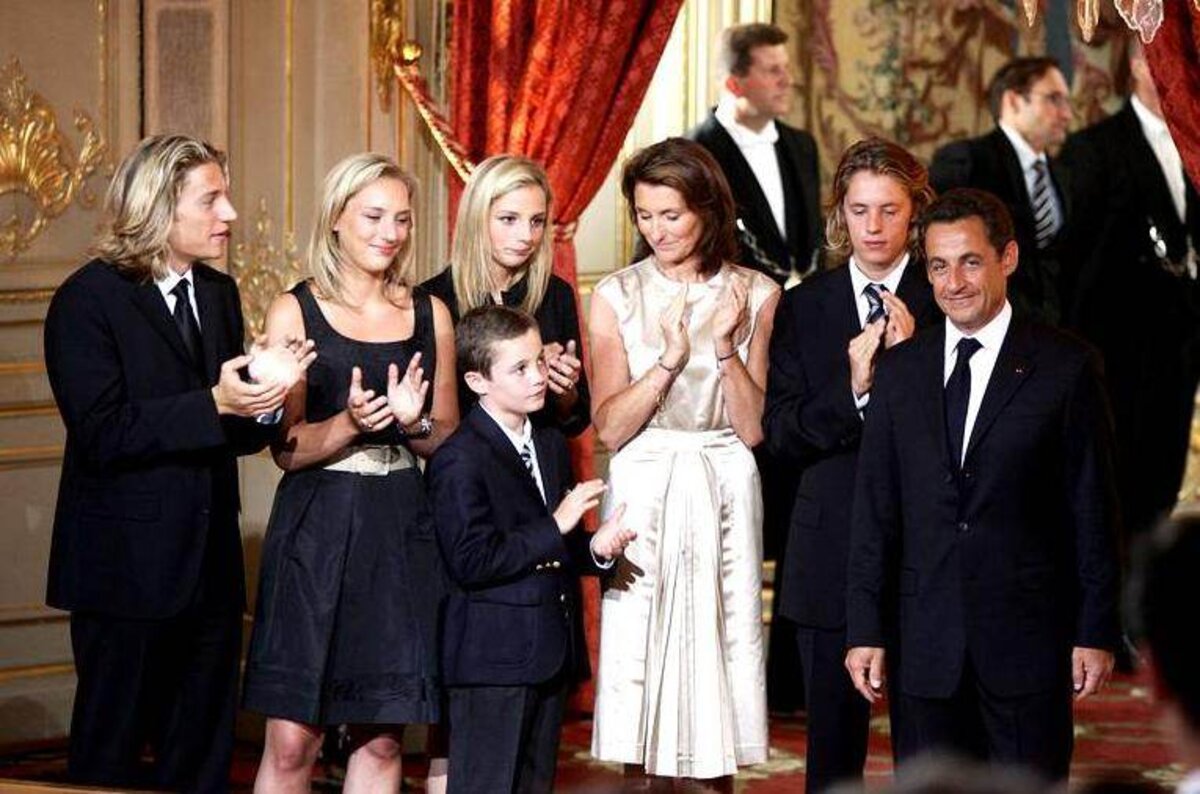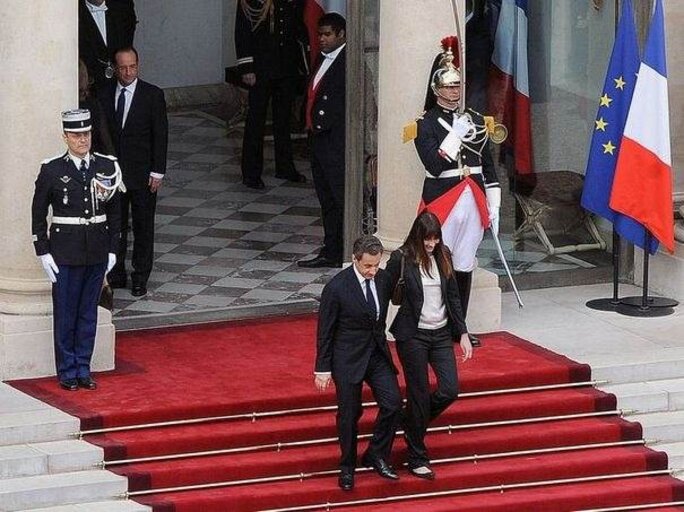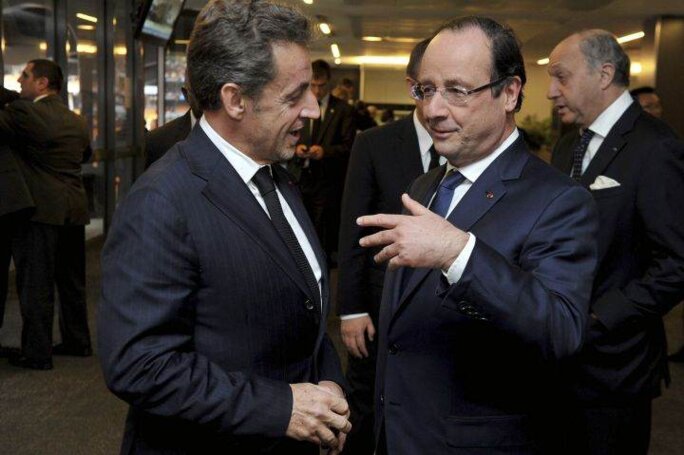If, as the writer Voltaire put it, “in dark times, fables are history” it is also sometimes the case that in the very darkest of times not even fables or any kind of stories do the trick. Instead all that such periods inspire is a desire to look backwards. The heralded return of former president Nicolas Sarkozy to the political fray in France in 2014 belongs to this category.
Nicolas Sarkozy's 'comeback' is certainly no carefully-crafted masterpiece of storytelling, and even if it were it would have been rendered illusory because it has already been retold so many times by the baying courtiers of the parrot-like media. Nor does it, as has been claimed, herald a new season of Sarkozyism. Indeed, the tale of his return is curiously devoid of all narrative structure, lacking the three elements that make up any story:
- 1. Intrigue
- 2. A certain narrative tension
- 3. Credibility on the part of the narrator
The story of Nicolas Sarkozy's heralded return has none of these characteristics. The secret has come out, the reader has been alerted and the narrator has been discredited.
1. Political intrigues need a secret plot line involving obscure or unknown sequences of events which are eventually revealed as the story unfolds. Yet Nicolas Sarkozy's return is a secret to no one. His desire for revenge has been in absolutely no doubt since he lost the presidential election on May 6th, 2012. Only the justice system (and Mediapart) can stand in his way. He is one of those politicians for whom being a candidate is an end in itself. He did not even stop being a candidate after his election win in 2007. So why would he no longer be one after his defeat in 2012? He is the permanent candidate. That is the only thing he knows how to do: campaign. So he has no choice. It is a Samuel Beckett-like scenario: 'Waiting for Sarko and not Godot'. With former interior minister Brice Hortefeux and former minister for professional training Nadine Morano as his sidekicks Lucky and Pozzo.
It is a classic whitewash job, though one that turns out to involve quite a delicate operation. It requires Sarkozy to create a sense of expectation over his return to politics. For that to work, he cannot quit the political scene entirely. So his close political allies have to occupy the political terrain to ensure they do not leave an inch of space for those on the Right who want to turn the political page and look to the future. Already, in October 2012, the news magazine Marianne was wondering whether “instilling the idea in public opinion so soon about a possible return did not risk making people tire of it”. To which I responded: “We can reply on you to prolong the suspense.” For the dirty secret of the 'Sarkozy System' is the complicity of the media who have, in effect, co-produced his political life for the last ten years.
2. In any story what is called the 'narrative tension' is produced by a delayed effect, created by suspense, surprise or even a dramatic turn of events of the kind that will maintain the reader's interest and keep them tuned in. The return of Nicolas Sarkozy is neither a new twist nor a surprise. The repetition ad nauseam of a plot whose outcome is already known strips away any effect of suspense. Nicolas Sarkozy has far too often made a soap opera out of politics for anyone to believe in a series two.

Enlargement : Illustration 1

In fact, we didn't have one but seven different series during his five-year term of office, each one containing a catalogue of events, familiar characters, secrets and moments of high drama. From the election campaign of 2007 (series 1) to his arrival at the Elysée with his stepfamily, followed by a divorce from wife Cécilia to his remarriage to Carla Bruni (series 2). Then from his reception by the British Queen at Windsor Castle and various attempts to make himself look presidential (series 3), to being 'Captain Courageous' in the financial crisis of 2008 (series 4). Next came the campaign and victory of Barack Obama in the US presidential elections which relegated Sarkozy's story to a quaint, regional sideshow, supplemented by public comments from Carla Bruni in support of “my husband”, (series 5), and later the military expedition in Libya which enabled people to forget the failure of French diplomacy during the Arab revolutions in Egypt and Tunisia (series 6).
Series 7 told the story of the fall of Sarkozy's big rival Dominique Strauss-Kahn, the election campaign of 2012 with the strange episode of the Toulouse killer Mohamed Merah, the revelations by Mediapart about the Libyan funding of Sarkozy's 2007 election campaign and the final extreme discourses against the Roma people, immigrants and social security fraudsters. The Sarkozy saga, like The Sopranos series, had come to its conclusion. It was a textbook example of the end of a series which had been kept going beyond its time; with scriptwriters short on inspiration and the use of ever-more marketing to make up for the lack of public interest and plummeting audience figures. Prolonging the story for another season was out of the question.
3. Nicolas Sarkozy belongs to the category of narrators that academics in this field call an 'unreliable narrator'. They define this by several character traits: psychological instability, deliberate attempts to deceive the reader or public, persistent prejudices regarding the race, class of gender of characters, major character faults such as pathological lying or narcissism, contradictory actions and judgements, unpredictability. In five years in office Sarkozy briefly and manically adopted the characteristics of previous presidents and other leaders. At various times he was inspired by French leaders Valéry Giscard d'Estaing, Georges Pompidou and François Mitterrand but also by Italian prime minister Silvio Berlusconi, British premier Tony Blair and US president George Bush. And this was when he was not looking for role models in the form of Ronald Reagan and Margaret Thatcher.
Through changes of style and policy changes Nicolas Sarkozy endlessly redrew the always elusive image of the presidential function.
One-way ticket to oblivion?
The result was a shaky portrait, overloaded with images superimposed on each other, depicting an untidy restlessness. We all recall the image of presidential candidate Sarkozy on the back of a Camargue horse dressed as a herdsman, of him on the yacht owned by French multi-millionaire Vincent Bolloré in May 2007, of his trip to Euro Disney with Carla Bruni, at the pyramids in Egypt, of his limping walk on the red carpet, as he felt obliged to move from one image to another, from one plan to another. Were he to return, the French people would see his unpredictable behaviour resurface.
There is an insurmountable contradiction concerning the credibility of Nicolas Sarkozy's word. He can only return to politics by betraying his previous commitment to quit politics. If he wants to remain true to his word, therefore, he cannot return to politics. His eventual return to politics is thus trapped in a logical paradox. If he comes back, his word loses all credibility. If he wants to keep his credibility he has to reject a comeback, but in that case his credibility would no longer be of any use to him. Therefore what must happen is that his return comes about not of his choosing, but rather because of a 'non-choice' on his part; because of fate. “The question isn't knowing if I want or don't want to come back. I cannot not come back. I have no choice. It is fate,” he now says.

Enlargement : Illustration 2

Some months ago he had already confided to his former agriculture minister Bruno Le Maire his intention of returning for the 2017 presidential election. “In view of the disastrous state in which France risks finding itself in five years, I won't have a choice. The question is not to know whether I am going to return, but rather if I have a choice, morally, when it comes to France not to come back. I cannot, morally, turn away when it comes to the French people,” he insisted, magnanimously.
This story of a heralded return therefore has nothing to do with the suspense surrounding a decision that's been deferred, it is instead a prime example of attracting attention, which is not about a narrative but is all about addiction. The hypothesis of his return to politics does not involve a choice between two possibilities, returning or not returning. It is, on the contrary, something that is fated to happen, and which is done according to a formula. First of all there is the setting out of the possibility of a return (against all the apparent evidence), then there is the attempt to give such a comeback credibility, before it finally becomes a certainty - by which point it has become something of a self-fulfilling prophecy.
The eponymous hero of Herman Melville's short story Bartleby the Scrivener constantly declares that he would prefer “not to” do something. Sarkozy has inverted this formula by asserting that he “cannot not [come back]” to politics. Both of them assert the overarching importance of a 'non-choice'. But if Bartleby's irresolution still preserves a trace of free will, albeit conditional, in his use of the phrase “I would prefer not to”, Sarkozy's formula highlights a clear inevitability, as shown by his use of the words “I cannot not...”.
In the case of Bartleby his curious disposition and preference “not to” do something leads to a dizzyingly unyielding paradox. But in Sarkozy's case it is simply a marketing technique. The basic aim of launching a brand or a product is to install the myth of its inexorable nature. A product arrives in the world with an air of inevitability. So it is with Sarkozy.
The year 2013 was the year of teasing, with telling signs gleaned from a trip abroad, from a concert given by his wife Carla Bruni, or by a confidence told to a third party at Sarkozy's office in rue de Miromesnil in Paris. They are postcards addressed by Odysseus Sarkozy on the road home to the Ithaca of his candidacy.
The year 2014, meanwhile, is the 'Sarkotique year'(1), the year of people getting used to his return, and of addiction. It is the launch of the new Sarkozy brand on the ruins of the old world. There is no suspense here. No surprise. Instead there is consumption of the brand, and addiction. The plan is no longer about attracting attention in some conventional saga of political conquest, a national story that gathers pace with every failure of the self-styled “normal” president, François Hollande. Instead it is simply about getting the audience used to the idea of a comeback. There is no narrative being given here. It is about creating a climate, an atmosphere suitable for the return of the 'ex'.
Sarkozy knows that he is risking everything in this comeback. A second defeat would lead to political banishment. A one-way ticket to oblivion. First of all he has to get public opinion used to the idea of his return, to defuse any reaction rejecting the idea. He wants people to get accustomed to the idea gradually, neutralising the opposition that was fuelled by a catastrophic term in office, and over which still hang the suspicions of the Karachi affair and the financing of his 2007 election campaign by Colonel Gaddafi's Libya. It is a process similar to what is known as 'mithridatism' in which a person is fed small but increasing amounts of a toxic substance in order to make them immune to its effects.
This imminent return by Sarkozy is not about some last resort to a saviour, a providential man. It is instead a relapse; but of what illness? The idea of retiring to a private villa sits uneasily with Sarkozy. Those who visit him in his Paris office describe him like a caged bear, a man possessed by just one thought – coming back. A “hungry man”. Those who advised him to vanish from the news for a while so that he could return to public gaze a new man have been disowned. The man is impatient and compulsive; his fickleness bordering on uncontrollable. He is a man in permanent replay mode, someone focussed on the short term, with no past or future, the prototype 'player'. The cause of an addiction.
The good doctor Hollande wanted to cure France of its addiction to Sarkozyism. But in his medical bag all he had were placebos and magical cures. So the illness has become even worse. In Italy this illness was called Berlusconi, and it came back twice (after the first outbreak of 1994, it returned in 2001 then 2008) because of the inability of the Italian Left to offer an alternative to neo-liberalism. In France the illness could follow the same course. Who can say today that a Sarkozy re-elected in 2017 would not be voted in for a third time in 2022? This is something that matters.
-------------------------------------------------
1. The French expression used here – and also for the title of this article in French – is '2014, année sarkotique', a play on the title of the famous Jane Birkin and Serge Gainsbourg song 69 Année erotique.
A third industrial revolution still in search of its politicians

Enlargement : Illustration 3

The newspaper leader writers are jumping up and down with impatience and the front pages on the return match between Hollande and Sarkozy in 2017 are already designed. This heralded return by Sarkozy to a media limelight that he has in reality never left feeds what Freud called “repetition compulsion”. The photos of Hollande and Sarkozy (see above) at the memorial service to Nelson Mandela in December provided the required image for this compulsion. The voyage of two presidents, one current, one ex, to South Africa, a trip that the press greeted as a sign of democratic civility, was in fact a major error on the part of Hollande, who had invited his predecessor. For while the United States may be used to this kind of civility, a former president there has never stood for an election against his successor.
The media's longing for the non-story of a heralded return, a tale without intrigue or timing and whose outcome is known in advance, cannot be explained in any other way. TV news channels are often criticised for this: because they are so repetitive they provoke a kind of boredom, even a sense of stupor. They excuse their actions by pointing out that their audience is constantly changing during the day. But we know very well how this kind of model can further addiction. It is no longer curiosity that drives people's interests, it is astonishment. The non-stop news channels have turned the flow of news into a sort of news fix; it's the secret of their attraction. In this way the political-media establishment manages to obscure the real collective issues at stake in society – issues linked to ongoing technological changes - by serving up the old-fashioned spectacle of an eternal duel for the summit of power. This is a catastrophic complicity in a presidential system that represents public life as a competition between individual ambitions, with the help of real-time 'infotainment' that removes the time for proper collective debate.
Nicolas Sarkozy's defeat in 2012 coincided with the end of thirty years of neo-liberal hegemony, just as Giscard d'Estaing's election loss in 1981 marked the end of the Thirty Glorious Years in France. Neo-liberal witchcraft, which maintained that deregulated financial markets and financial speculation could create virtuous growth, is now colliding head on with the planet's greatest challenges, not just environmental but also anthropological. The financial, economic and social crisis since 2008 has marked the end of the old world, of which Nicolas Sarkozy is an extreme example. The third industrial revolution has not yet found its new political class.
It is in this void, this historic disconnect, that the Sarkozy brand prospers. Sarkozyism represents the exhaustion of a way of conducting politics that all political leaders, on the Left as well as on the Right, have not yet grasped. It is from this Sarkozyism that we urgently need to detox ourselves.
---------------------------------------
Christian Salmon is a writer and researcher at the Centre for Research in the Arts and Languages at the CNRS in Paris and a regular contributor to Mediapart. Watch a video of him here, with an English translation, describing the thesis behind his book 'Storytelling: Bewitching the Modern Mind'.
----------------------------------------
English version by Michael Streeter


